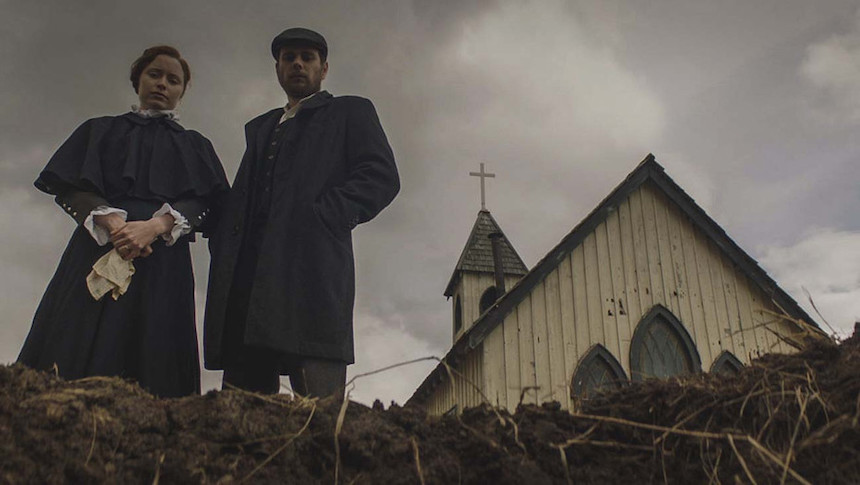Review: THE CURSE OF AUDREY EARNSHAW, Folk Horror, Witch Terror
Hannah Emily Anderson, Catherine Walker, and Jared Abrahamson star in a horror drama by writer/director Thomas Robert Lee.

Between the existential dread of Robert Eggers’ masterful feature-length debut, The Witch, five years ago, and the existential nihilism of Ari Aster’s cult-classic-in-the-making Midsommar last year, as well as The Ritual, The Apostle, and Hagazussa: A Heathen's Curse, folk horror has seen something of a minor resurgence in recent times.
It’s relatively easy to see why: The combination of remote, non-urban settings, the supernatural, witchcraft, and secret societies, not to mention (but we’ll mention it, anyway) the potential for sheer, unadulterated terror afforded by pre-modern isolation have proven almost irresistible to filmmakers, including Canadian writer-director Thomas Robert Lee’s (Empyrean) worthy, if at times perplexingly frustrating for its mix of under- and over-exposition, addition to the newly burgeoning sub-genre, The Curse of Audrey Earnshaw.
Set, like so many of its predecessors, in an isolated, rural community, The Curse of Audrey Earnshaw centers on Agatha Earnshaw (Catherine Walker) and her 17-year-old daughter, Audrey (Jessica Reynolds). While the nearby town, deliberately unchanged for the better part of a century even as the outside world travels via combustible engine and jet plane (cf., M. Night Shyamalan’s The Village), struggles with blight, famine, and disease, the apparent byproduct of an eclipse not coincidentally tied to Audrey’s birth, Agatha and Audrey live in relative prosperity.
That's a sore point for the religiously minded townsfolk who worship the Church of Ireland’s iteration of the Christian God and see Agatha’s material success as the product of witchcraft and/or sorcery. (Spoiler alert: They’re not wrong, as Lee confirms early on, putting the audience in a superior position to the prejudiced townsfolk.)
While Agatha keeps the preternaturally radiant Audrey away from the prying eyes and desires of the local townsfolk, especially the men, Audrey naturally bristles at her mother’s rules of engagement, setting up a long-running conflict between mother and daughter that practically foreshadows a no-good, terrible, awful end for one or both women. Audrey’s growing self-confidence and independent streak come to the fore when, hiding from view on a trip through town, she witnesses her mother’s mistreatment at the hands of the townsfolk, including an act of violence that essentially sets the central plot in motion and with it, Audrey’s witchcraft-powered, world-shattering reign of havoc and vengeance (i.e., the “curse” of the title) on the unsuspecting townsfolk.
In horror, the question of whether a character or characters deserve their fate, especially when, through some minor transgression, the punishment they receive can be disproportionate to the original offense, is almost always present, hovering off-frame at the edge of audience consciousness and The Curse of Audrey Earnshaw is certainly no different. Lee twists the old adage about hell, fury, women, and scorn, and turns into hell, fury, witches/coven, and even more hell (e.g., suffering, pain, and anguish). It makes any mistreatment Agatha and Audrey, as defiant, subversive women locked into a potentially fatal struggle with a patriarchal, misogynist, regressive mini-society that has no place for them except as pariahs, suffer at the hands of the townsfolk wholly unjustified, but excessive and gratuitous in response as well.
Ultimately, that leaves little room for sympathy or empathy for Agatha or Audrey individually or collectively, though Walker and especially relative newcomer Reynolds add a measure of depth to their performances periodically missing from Lee’s screenplay. The townsfolk fare even worse. While the townsfolk are objects of scorn, even hatred for Audrey, they’re at best objects of pity for the audience.
Bound by suffocating social, cultural, and gender roles (they could always leave and/or move on from their 100-year-old experiment in isolation from the outside world, but it’s completely beyond their limited imaginative powers), they eventually devolve into nothing more minor obstacles to Audrey’s terrifying coming-of-age into her full, Carrie-like power as a supernaturally powered woman and witch.
The Curse of Audrey Earnshaw opens in theaters today (Friday, October 2) and will be available on all major VOD and digital platforms on October 6, 2020. Visit the official Facebook page for more information.







